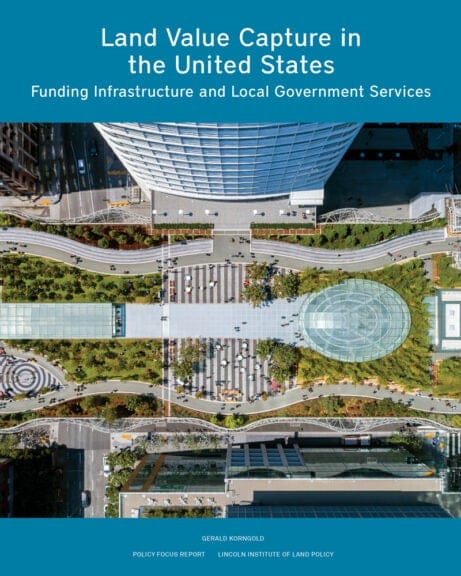Policy Focus Report

Land Value Capture in the United States
Funding Infrastructure and Local Government Services
September 2022, English
Land value capture (LVC) is based on a simple core premise: public action should generate public benefit. As challenges mount from rapid urbanization, deteriorating infrastructure, climate change, and more, this funding source has never been more important to the future of municipalities. LVC tools include special assessments, exactions, impact fees, linkage fees, incentive zoning, transferable development rights with contribu-tions, and upzoning with contributions. To date, American law has permitted LVC tools, subject to some limitations. As a result, land value capture is a viable and potentially important method for funding much-needed public infrastructure, improvements, and programs. Policy makers should seriously consider increasing LVC-based financing.
About the Author
Gerald Korngold is a Professor of Law at New York Law School and serves as a Distinguished Scholar at the Lincoln Institute of Land Policy. An elected member of the American Law Institute and the American College of Real Estate Lawyers, he has lectured nationally and internationally on land ownership and transactions, land use, and property law.
Reviews
“Disruptions associated with real estate development often bring political strife, and Gerald Korngold has produced an analysis of land value capture that will be highly valuable to every municipality. Though it has played a role in helping governments fund projects and address public needs for more than a century, land value capture is increasingly essential for a municipality to effectively address public concerns about mobility, resiliency, affordable housing, and equity. This narrative will prompt policy makers and stakeholders to think anew about how to harness real estate development to deliver important social goods.”
— Brian Golden, Former Director, Boston Planning & Development Agency
“There is growing interest in and professional demand for more substantive, experiential learning related to the theory and practice of land value capture. What kinds of tools are out there? How are they designed? What are the legal intricacies that we need to be careful about? What insights and lessons can we draw from past practices? Gerald Korngold’s report provides an informative and comprehensive answer. It will be a useful resource for both educators and professionals as the planning community continues to figure out how to serve the public better and more justly.”
— Mi Shih, Associate Professor, Rutgers University
“Gerald Korngold provides an all-too-rare pragmatic overview of a topic that stokes great passion from theorists and practitioners alike. Setting aside the ‘should’ until a final section of thoughtful recommendations, he clearly explains many of the tools applicable to the U.S. context. While the report acknowledges the pitfalls of pursuing various land value capture mechanisms, it also provides ample case studies that ultimately assure the reader that something can be done efficiently and effectively in many communities. This will be foundational reading for scholars, planners, and policy makers for years to come.”
— Ian Carlton, Senior Economic Advisor, ECONorthwest
Keywords
Assessment, Bus Rapid Transit, Community Development, Development, Economic Development, Henry George, Housing, Infrastructure, Land Law, Land Market Regulation, Land Use, Legal Issues, Local Government, Municipal Fiscal Health, Public Finance, Public Policy, Regulatory Regimes, Taxation, Transportation, Urban Development, Urban Revitalization, Valuation, Value Capture, Zoning
